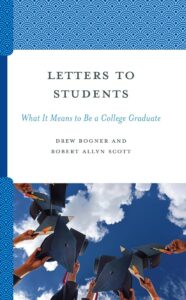First-Year Seminars: A Recipe for Retention
Article from HigherEdJobs by former Registry Member, Dr. Robert A. Scott | Monday, October 28, 2024

One-third of students fail to graduate — in six years! In 2020, the six-year graduation rate for those who entered a four-year college in 2014 was 64%. This is a scandal.
Concerns about student retention and graduation are among the reasons that nearly three-quarters of four-year institutions have started first-year college programs designed to help students navigate and succeed in college. A report on “High-Impact Practices” for student success includes first-year seminars and experiences as having significant benefits. Another report supports the claim.
According to research from the American Educational Research Association, earning a college degree provided a rate of return of 9.88% for women and 9.0% for men. “In other words, a college education is expected to yield an average annual rate of 9 to 10 percent throughout an individual’s career” more than a high school diploma. In addition, other research had demonstrated that earning a college degree results in better health outcomes and citizen engagement.
So, we know the benefits of graduating from college. What more can we do to improve the rate?
Drawing on our combined 75 years as college faculty, administrators, and university presidents, the former president of a competing institution and now colleague, Dr. Drew Bogner, and I co-authored “Letters to Students: What it Means to be a College Graduate.” Framed as letters to potential and current students, the chapters discuss critical topics such as how to chart a life path, achieve one’s own definition of success, and live a life of meaning.
The letters discuss how to get the most out of college, how to make thoughtful decisions about important aspects of life, and how to find a job and a career and a mentor. Lastly, the letters discuss how to make a difference. At the end of each letter, there are questions for reflection which make for writing assignments and discussions.
Letters to Students: What It Means to Be a College Graduate
By Dr. Drew Bogner and Dr. Robert A. Scott | Rowman & Littlefield, 2024
 College is more than earning a degree. It’s a time to explore, grow, and define who you are. It’s where students discover new interests, form lasting friendships, and begin building a life and career.
College is more than earning a degree. It’s a time to explore, grow, and define who you are. It’s where students discover new interests, form lasting friendships, and begin building a life and career.
In Letters to Students: What It Means to Be a College Graduate, Dr. Drew Bogner and Dr. Robert Scott offer personal, thoughtful letters to students that explore college life, purpose, and values. Their approach is warm, engaging, and grounded in experience.
Book Reviews:
“I’ve recommended your new book to a number of people at Cornell and elsewhere. You and Dr. Bogner complement each other nicely, and I admire how your voices remain distinct and distinctive, something essential in a book that celebrates and encourages young people to develop and honor their passions and intellect. From discussions of the practical—how to ask for help—to the ethical, your book is a welcomed primer. Yet most important for me is its high regard for an engaged citizenry: We are not isolated, and when we are we are in crisis. Your book reminds us, and powerfully, that we are interdependent, that our dreams are indissoluble from the dreams of others, and as I always say, coming from my church days, I am in you, and you are in me. I really like your book. You are very Emersonian, which is not a bad place to be. And Dr. Bogner does wonderful things with rhythm. In one of his essays he writes, Check…. and later on, check. It works wonderfully for the eye and the ear. And you, sir, write beautifully. Some of your essays are simply luminous.”
By, Kenneth Anderson McClane, Jr. the W. E.B. DuBois Professor of Literature, Emeritus, Cornell University, July 26, 2024. _______
_____________________________________________________________________________
“In Letters to Students: What It Means to be a College Graduate, Dr. Drew Bogner (President Emeritus, Molloy University) and Dr. Robert Scott (President Emeritus, Adelphi University and Ramapo College of New Jersey) investigate the value proposition of higher education through a distinctive lens. Rather than depend on dry academic analysis, the authors use an engaging and imaginative approach by embedding their inquiry and advice in letters written to students. Clearly the authors are well versed in the research that emphasizes higher education as good for the individual and for society. In this book, these experienced academic leaders pitch their argument not only to their peers or national opinion makers but also to prospective students and recent graduates.
Prospective students and recent graduates will sense the genuine interest in students and equitable student success of the authors that permeates the book. Drs. Bogner and Scott are taking on a timely and important topic and doing so in a way that should garner interest from several audiences, including students, parents, and grandparents.”
By, R. Barbara Gitenstein, President Emerita, The College of New Jersey
First-Year Seminars: A Recipe for Retention
Article from HigherEdJobs by former Registry Member, Dr. Robert A. Scott | Monday, October 28, 2024
One-third of students fail to graduate — in six years! In 2020, the six-year graduation rate for those who entered a four-year college in 2014 was 64%. This is a scandal.
Concerns about student retention and graduation are among the reasons that nearly three-quarters of four-year institutions have started first-year college programs designed to help students navigate and succeed in college. A report on “High-Impact Practices” for student success includes first-year seminars and experiences as having significant benefits. Another report supports the claim.
According to research from the American Educational Research Association, earning a college degree provided a rate of return of 9.88% for women and 9.0% for men. “In other words, a college education is expected to yield an average annual rate of 9 to 10 percent throughout an individual’s career” more than a high school diploma. In addition, other research had demonstrated that earning a college degree results in better health outcomes and citizen engagement.
So, we know the benefits of graduating from college. What more can we do to improve the rate?
Drawing on our combined 75 years as college faculty, administrators, and university presidents, the former president of a competing institution and now colleague, Dr. Drew Bogner, and I co-authored “Letters to Students: What it Means to be a College Graduate.” Framed as letters to potential and current students, the chapters discuss critical topics such as how to chart a life path, achieve one’s own definition of success, and live a life of meaning.
The letters discuss how to get the most out of college, how to make thoughtful decisions about important aspects of life, and how to find a job and a career and a mentor. Lastly, the letters discuss how to make a difference. At the end of each letter, there are questions for reflection which make for writing assignments and discussions.
Letters to Students: What It Means to Be a College Graduate
By Dr. Drew Bogner and Dr. Robert A. Scott | Rowman & Littlefield, 2024
 College is more than earning a degree. It’s a time to explore, grow, and define who you are. It’s where students discover new interests, form lasting friendships, and begin building a life and career.
College is more than earning a degree. It’s a time to explore, grow, and define who you are. It’s where students discover new interests, form lasting friendships, and begin building a life and career.
In Letters to Students: What It Means to Be a College Graduate, Dr. Drew Bogner and Dr. Robert Scott offer personal, thoughtful letters to students that explore college life, purpose, and values. Their approach is warm, engaging, and grounded in experience.
Book Reviews:
“I’ve recommended your new book to a number of people at Cornell and elsewhere. You and Dr. Bogner complement each other nicely, and I admire how your voices remain distinct and distinctive, something essential in a book that celebrates and encourages young people to develop and honor their passions and intellect. From discussions of the practical—how to ask for help—to the ethical, your book is a welcomed primer. Yet most important for me is its high regard for an engaged citizenry: We are not isolated, and when we are we are in crisis. Your book reminds us, and powerfully, that we are interdependent, that our dreams are indissoluble from the dreams of others, and as I always say, coming from my church days, I am in you, and you are in me. I really like your book. You are very Emersonian, which is not a bad place to be. And Dr. Bogner does wonderful things with rhythm. In one of his essays he writes, Check…. and later on, check. It works wonderfully for the eye and the ear. And you, sir, write beautifully. Some of your essays are simply luminous.”
By, Kenneth Anderson McClane, Jr. the W. E.B. DuBois Professor of Literature, Emeritus, Cornell University, July 26, 2024. _______
“In Letters to Students: What It Means to be a College Graduate, Dr. Drew Bogner (President Emeritus, Molloy University) and Dr. Robert Scott (President Emeritus, Adelphi University and Ramapo College of New Jersey) investigate the value proposition of higher education through a distinctive lens. Rather than depend on dry academic analysis, the authors use an engaging and imaginative approach by embedding their inquiry and advice in letters written to students. Clearly the authors are well versed in the research that emphasizes higher education as good for the individual and for society. In this book, these experienced academic leaders pitch their argument not only to their peers or national opinion makers but also to prospective students and recent graduates.
Prospective students and recent graduates will sense the genuine interest in students and equitable student success of the authors that permeates the book. Drs. Bogner and Scott are taking on a timely and important topic and doing so in a way that should garner interest from several audiences, including students, parents, and grandparents.”
By, R. Barbara Gitenstein, President Emerita, The College of New Jersey
HIRE AN INTERIM
Searching for an Interim?
Please contact us for more information.

